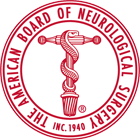Below is a list of some frequently asked questions, but please feel free to call our office if you need additional information.
A neurosurgeon is a doctor who specializes in the surgical treatment of neurological problems. A neurosurgeon spends at least 4 years in medical school, 1 year of internship and at least 6 years in residency training. Although more commonly known as a “brain surgeon”, a neurosurgeon is also an expert on the surgical care of problems involving the Brain, spine and nerves. A neurosurgeon is different from a neurologist which is a doctor who specializes in the medical treatment of neurological problems. A patient is often sent to see a neurosurgeon when they have a neurological problem that may benefit from surgery. If surgery is not deemed necessary, the neurosurgeon can still offer nonsurgical treatment options for the management of certain neurological conditions.
Speak to the doctors, nurses, and other medical experts who know the surgeon and his/her results. Anesthesiologists and operating room nurses first hand see the technical skill of the surgeon. Word of mouth from other patients can also be helpful.
Back pain may have one or more of several direct causes. Most often back pain is due to a type of generalized arthritis known as spondylosis. Sudden trauma as well as chronic degenerative changes can put stresses on the joints of the neck and back that will cause pain. The neck and back often feels stiff. This joint pain is often worse in the morning and with inactivity. It may improve throughout the day as the joints “loosen up”. Anti-inflammatory pain medicines and muscle relaxers often help to break this cycle of pain. This type of back pain may or may not improve with surgery depending on its relationship with pain in the legs.
Back pain may also be due to degeneration of the intervertebral discs and abnormal motion in the spine. The most extreme example would be an acute trauma with a fractured spine and spinal instability. Degenerative changes over time can also lead to abnormal motion. This back pain is often accompanied with pain in the arms or legs due to pressure on the nerves as well. This type of back pain may benefit from surgery.
The nerves that travel down the arm/leg all originate from the spinal cord within the neck/and upper back. A bone spur or disc herniation in the neck/back may push on the nerve where it exits from the spinal cord (the nerve root). This pressure will irritate the nerve and may lead to pain, numbness/tingling, or weakness in the distribution of that nerve.
The most common causes of back pain are due to strained muscles and don’t require surgery. It will get better over time with rest. Sometimes – though less common – physical therapy is needed.
If you have intense pain accompanied by a pain shooting down your leg, then you may have a pinched nerve. It may be due to herniated disc or other problems in your lower back. Depending on your symptoms, physical exam findings and images, you may or may not need surgery to get better quickly.
These complaints are concerning for a pinched nerve. You should be evaluated by your doctor and a referral to a neurosurgeon is likely appropriate. It may get better over time with rest, or with physical therapy. Depending on your symptoms, physical exam findings and images, you may or may not need surgery to get better quickly.
An MR study is performed first as it does not involve radiation. It provides excellent information regarding the soft tissues (nerves, muscles etc.) of the spine. However, CT studies better demonstrate bone and bony disease. Therefore, often the two are ordered when a spinal operation is being planned.
Yes, they provide an overview of the bones of the spine (cervical, thoracic, lumbar). Plain X-rays can document whether the spine is stable (does not move abnormally) or unstable (shows too much movement).
We operate to remove the disc fragments and leave more room for the spinal cord or nerves. We take out all the soft disc material that is pinching the spinal cord or nerve root.
If you have a damaged cervical disc, we evaluate the need for discectomy and fusion, or replacement. Since we offer both, we can help you to choose the most appropriate option based upon your individual circumstance.
Yes. If the tumor is near the surface and has not invaded deep structures or major blood vessels, then resection (tumor removal by surgery) is less complex. If the tumor is invading large draining veins, major arteries or the brain surface, then complete removal becomes more complex.
The location of the tumor is the most important elements in predicting a successful result. The goal of the operation is to remove the meningioma totally while preserving or improving your neurological function. For patients in whom total removal of the tumor carries significant risk of morbidity (any side effect that can cause decreased quality of life), it is better to leave some tumors in place. In this case, the patient would be observed over time, and in some patients the tumor may remain stable indefinitely. In others, surgery at a future date or radiation therapy may be used.
The symptoms associated with brain tumors can be very subtle, and difficult to detect. In fact, many tumor found accidentally (due to brain scanning for another reason like after a car accident) may not have had any symptoms. Large tumors will often headaches and neurological deficits, generally, there are symptoms that provide clear warning signs and require a physician office visit. It is unlikely you have a brain tumor if you have normal concentration, memory, vision, balance, and hearing; if you have not experienced a dramatic change in personality; or are not weak on one side of your body.
In general, it is not necessary to shave your entire head, although the area immediately around the incision must be shaved.
Bring any medical records you have including a list of your current medications and allergies. Dr. Etebar or an office staff will instruct you if you need to bring any additional items.
It depends on what type of procedure you have. Dr. Etebar will provide you with that information prior to surgery.
The amount of time will depend on what type of surgery you have as well as your condition before surgery. Dr. Etebar will review your treatment and recovery plan with you.
Recovery time depends on the kind of procedure, the patient’s age, and health before the procedure. You may have some tenderness around the area of the incision. You will not be able to perform heavy lifting, exercise or activities. As with any procedure, Dr. Etebar will give you specific directions.
All new patients must have a referral from a qualified medical care provider. Talk with your medical care provider about the problem you are having and they will decide whether a neurosurgical consultation is warranted. If they agree that a neurosurgical consultation is warranted then they can contact our office for an appointment.
The spine is made up of many vertebral bodies (building blocks). Between these are discs (shock absorbers). Over time, the center of these discs can herniate (come out of) the disc and push on the nerves in the spine.
No, only about 15% of discs produce significant enough spinal cord or nerve root compression to warrant surgery.
This describes the removal of the bony arch which is located in back of the spine (neck, mid back, lower back). Its removal is often described as a “decompression”.
If there is too much motion at a lumbar spinal level, any time the patient moves, the nerve tissue can be transiently compressed resulting in pain and transient or permanent neurological injury or deficits. When the pressure is taken off (laminectomy, decompression), fusion may be required.













